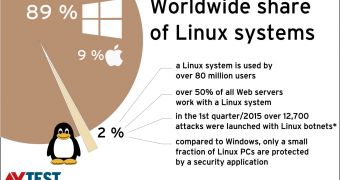AV-TEST, an Independent IT-Security Institute, has just published an interesting analysis regarding the anti-virus solutions for the Linux platform provided right now. The result is not at all encouraging.
One of the aspects that have remained a constant regarding Linux is that it's the most secure system available for regular users and businesses. That hasn't changed all that much, even if Linux-powered distributions are getting more widely used. That would also mean that viruses and malware for Linux are likely to evolve, and the same can be said about anti-virus solutions.
Linux users don't have to concern themselves with anti-virus applications, but things do slip through the cracks. If you are using a Linux system, you know that you get fixes for various vulnerabilities all the time because that's usually how bad things can be corrected on a Linux-powered OS.
Now, even if Linux systems are usually safe, it doesn't mean that users can't make mistakes. All it takes is for someone to install a tainted third-party application or repository, and a Linux system becomes infected. It rarely happens, if ever, but it's a scenario worth thinking about.
Also, like any other platform out there, the problem of age still exists. There are a lot of users in this world that don't upgrade their systems when they reach end of life, and they don't upgrade their systems on a regular basis. They might not be as vulnerable as a Windows system, but they are vulnerable nonetheless.
Researchers say that free anti-virus apps are not efficient
The guys from AV-TEST did some extensive testing on Linux by using an Ubuntu distro. They infected the OS with 900 "attackers" and used various applications to root them out. From the looks of it, the best ones are also the commercial versions, which sounds a little bit fishy, I know, but here are the results.
"Only Kaspersky Endpoint Version achieved 100-percent detection under Linux. Following close behind with 99.7 percent was ESET - AVG still reached 99 percent. The server versions of Kaspersky Lab and Avast do in fact recognize over 98 percent of the attackers. Symantec, offering the best detection under Windows, only finds 97.2 percent of the malware under Linux."
"That's where the free fall begins. Coming in at the bottom of the list in detection of Linux malware threats are ClamAV, McAfee, Comodo and F-Prot. Their rates ranged between 66.1 and 23 percent. This means that in the worst case, 77 out of 100 threats simply remain undetected despite protection software under Linux," reads the analysis from AV-TEST.
Should we believe them?
You might wonder just how good the guys at AV-TEST are at testing this stuff. When it comes to the Windows platform, AV-TEST is used almost as a standard, and most anti-virus applications get certifications from them, so they are usually highly regarded. I have no reason not to believe what they say, but there are a couple of problems with the testing.
First of all, they just mention Ubuntu, without any other details about the version number. Secondly, there are other Linux distributions out there, a lot of them, many use different file systems, kernels, and so on. There are too many unknowns and stuff that's been left out from the report, stuff that is usually important, so it's up to you to decide if you want to believe them or not.

 14 DAY TRIAL //
14 DAY TRIAL //